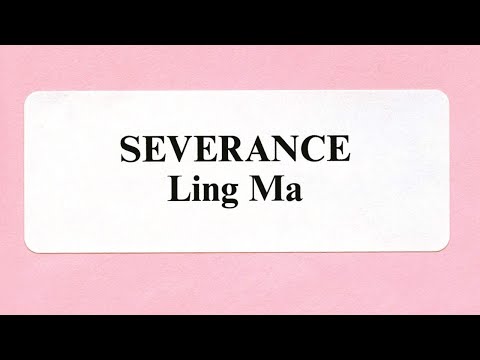Severance Ling Ma

In Ling Ma’s debut novel “Severance,” a captivating blend of dystopia, satire, and existentialism, readers are plunged into a world that feels uncannily familiar yet hauntingly foreign. Ma’s narrative is a poignant exploration of modernity, consumerism, and the human condition, wrapped within the trappings of a pandemic apocalypse. Through the eyes of her protagonist, Candace Chen, Ma guides us on a journey that transcends mere survival, delving deep into questions of identity, purpose, and the meaning of existence.
At the heart of “Severance” lies a profound critique of contemporary society. Set against the backdrop of a deadly pandemic known as Shen Fever, which turns its victims into mindless automatons repeating routine tasks until their bodies deteriorate, the novel lays bare the emptiness and monotony of modern life. Candace, an aimless millennial working a soul-crushing job in a publishing house in New York City, finds herself navigating a world that has lost all semblance of normalcy. Yet, as society collapses around her, she finds herself oddly liberated, freed from the shackles of a life devoid of meaning.
Ma’s portrayal of Candace’s journey is both intimate and universal. Through her experiences, we witness the struggle to find purpose in a world that seems devoid of it. As Candace embarks on a perilous journey across the desolate landscape of post-apocalyptic America, she grapples with questions of identity and belonging. Her Chinese immigrant background adds another layer of complexity to her character, as she grapples with issues of cultural assimilation and alienation.
“Severance” also serves as a powerful commentary on consumerism and the cult of productivity. In the pre-apocalyptic world depicted in the novel, Candace finds herself trapped in a cycle of work and consumption, chasing after material success in a relentless pursuit of the elusive American Dream. However, as the world crumbles around her, she comes to realize the hollowness of these pursuits. The novel forces readers to confront uncomfortable truths about the nature of modern capitalism and the toll it takes on the human psyche.
Central to the narrative is the theme of routine and repetition. As victims of Shen Fever mindlessly repeat their last actions until their bodies give out, Ma draws a parallel to the mundane rituals of everyday life. Whether it’s Candace’s monotonous work routine or the endless cycle of consumerism, the novel exposes the futility of these repetitive behaviors. Yet, amidst the chaos and destruction, there is also a glimmer of hope – the possibility of breaking free from these patterns and forging a new path forward.
Ma’s prose is both lyrical and precise, capturing the bleak beauty of a world in decline. Her descriptions of abandoned cities and crumbling infrastructure evoke a sense of desolation and despair, while her vivid characterizations breathe life into a cast of unforgettable characters. Through her meticulous attention to detail, Ma creates a world that feels eerily plausible, inviting readers to immerse themselves fully in the narrative.
One of the most compelling aspects of “Severance” is its exploration of memory and nostalgia. As Candace grapples with the loss of her past life and struggles to come to terms with her present reality, she finds solace in memories of her childhood in China. These flashbacks serve as a poignant reminder of the fragility of memory and the ways in which our past shapes our present. In a world that is constantly changing, it is our memories that anchor us to our sense of self.
“Severance” is a novel that defies easy categorization. Part dystopian thriller, part existential meditation, it is a work that lingers in the mind long after the final page has been turned. Through its searing critique of contemporary society and its exploration of timeless themes such as identity and belonging, Ling Ma has crafted a literary masterpiece that is as thought-provoking as it is unforgettable. In a world that often feels increasingly fractured and uncertain, “Severance” serves as a timely reminder of the enduring power of human resilience and the importance of finding meaning in the midst of chaos.





